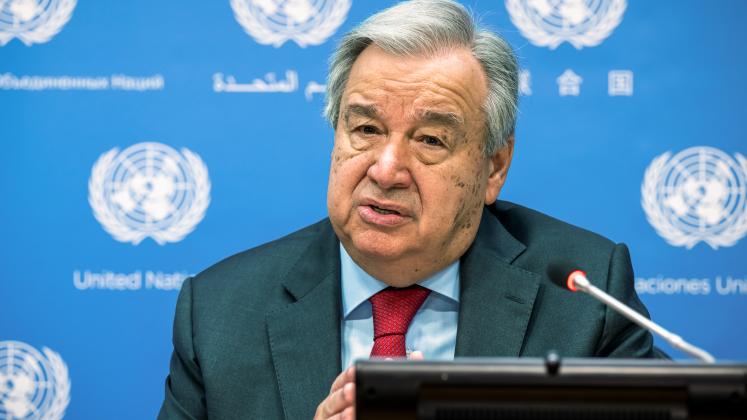Breakthroughs in artificial intelligence (AI) promise a cornucopia of benefits, according to the optimists: wealth creation across the economy, novel treatments for cancer, better prediction of weather, self-driving vehicles and more.
The pessimists worry about disinformation, restriction of freedoms, reinforcement of biases and structural racism, unmanageable shifts in labour markets, autonomous weapons, and further entrenchment of tech monopolies.
Regardless of where you stand on the optimism-pessimism continuum, this is an important moment. Generative AI based on internet-scale datasets has shaken up the tech industry, caught the popular imagination and made governments sit up and take notice.
This historical moment to advance human learning and prosperity has been compared to the invention of the printing press. It may be bigger. As UN Secretary-General António Guterres noted in his remarks to the first UN Security Council debate on AI on 18 July 2023, it took more than 50 years for printed books to become widely available across Europe. Chat GPT reached 100 million users in just two months.
However, this might as well be happening on another planet for a lot of people – globally, 2.7 billion people are still unconnected to the internet. Where there is access, it is often slow and costly. During Covid, hundreds of millions of children in developing countries struggled with low-end devices, limited connectivity and teachers who were not ready for the digital age. On top of this digital divide looms a data and AI divide. According to recent UN estimates, while monthly global data traffic is forecast to grow 400 percent by 2026, activity is concentrated among a few global players.
Tale of two cities
AI risks becoming “a tale of two cities”, one data-rich and another data-poor. For example, AI-enabled automated medical diagnosis tools, critical for bringing medical care to the global South with chronic shortages of specialised doctors, are trained with data mainly gathered in the Global North. This can have deadly consequences for the accuracy of these devices and for diagnostics equity.
One city in our proverbial “tale of two cities” ends up receiving better treatment than the other. Synthetic data generated by computers is the answer, some would say. However, synthetic data depends on the richness of existing data, which again is not evenly distributed between the global South and North. So the digital divide marches on!
Will we end up with a small number of companies building powerful AI applications while the rest merely contribute data and pay for content and services created by those applications? In a world where the wealth of the top 1% has grown exponentially, would the rich get richer and the powerful more powerful? Or would AI level the playing field for those who have missed the previous industrial revolutions? And help them leapfrog daunting development challenges?
These are critical questions for the global South. Developing countries have young populations that need quality jobs. In addition to the social imperative, economic growth needs to respect the sustainability imperative. Countries trying to catch up cannot rely on smoke-stack technology to fulfil their development aspirations. They will need to leverage digital transformation and all emerging technologies, including AI.
Just as the opportunities created by AI cannot just be a matter for a few, the challenges too need a global perspective. Content moderators and data curators for tech companies are often based in the global South. Harmful content has left many with mental health problems. Surveillance technologies developed in advanced countries have been sold in the global South to undermine personal freedoms and democracy.
Risks with the use of AI in financial markets in the North or on the battlefield anywhere could have global repercussions. We cannot have a repeat of what happened with social media platforms a decade ago. In hindsight, there should have been a global interdisciplinary conversation on social media’s impact and governance at the outset.
Fortunately, both optimists and pessimists on AI are united on one issue: AI matters for humanity at large. Therefore, its governance should also be a matter for all humanity. Every country, big or small, rich or poor, must have a voice in how we harness AI and mitigate its risks. While different regions and countries, such as the EU and the United States, are taking measures, a universal approach is needed.
Governance framework
These are the reasons why the UN Secretary-General has welcomed calls by experts and Member States for the creation of a new UN entity to support collective efforts to govern this extraordinary technology inspired by models such as the International Atomic Energy Agency, the International Civil Aviation Organisation, or the Intergovernmental Panel on Climate Change.
Such an entity could gather knowledge and expertise and put it at the disposal of Member States and the international community. It could support collaboration on the research of AI tools to accelerate sustainable development.
As a first step, the Secretary-General is convening a multi-stakeholder High-Level Advisory Body for Artificial Intelligence that will report back for options for global AI governance by the end of the year. This is a unique opportunity for experts from governments, private sector, civil society, the technology sector, and academia to come together to create a global scientific consensus on opportunities and risks of AI, and provide guidance to the international community on how best to govern AI in the benefit of all humanity.
Already some elements of this governance framework are emerging around data protection, risk-based assessments of AI algorithms and the responsible use of AI systems. Data must be accurate, representative and gathered justly. Algorithms must be tested for safety and must not discriminate. AI must be used for good and not subverted for nefarious goals.
Powerful technologies like AI have a Janus-like character. Like the two-faced Roman god, they herald a transition from the past to something new. Who steers these transitions and for what purpose is a critical public policy question.
We must debate the changes that AI will herald in the inclusive multilateral setting of the United Nations. The Secretary-General’s multistakeholder Advisory Body on AI is the right starting point for this global conversation.
This article was first published by Daily Maverick. Read the original article on the Daily Maverick website.
Suggested citation: Amandeep Singh Gill, Tshilidzi Marwala. "Secretary-General António Guterres Convenes Critical Body to Debate Global Governance of Artificial Intelligence," United Nations University, UNU Centre, 2023-08-16, https://unu.edu/article/secretary-general-antonio-guterres-convenes-critical-body-debate-global-governance.




